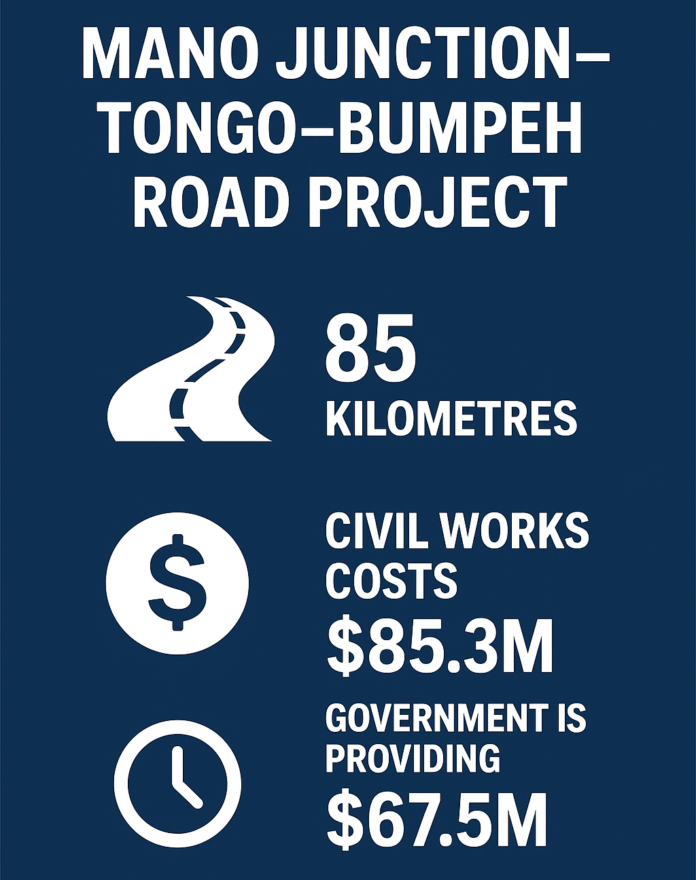By Lawrence Williams
Parliament last week ratified a major public-private partnership (PPP) agreement for the design, reconstruction, tolling, operation and maintenance of the Mano Junction–Tongo–Bumpeh road under a design, finance, build-operate-transfer (DFBOT) framework, but glaring gaps in transparency are raising serious concerns.
The agreement is between the State and Societe Djura Maritec Construction (SDMCO) Ltd (Sponsor), a Guinean-based company incorporated in Sierra Leone, and its partner, Molumus Construction and Logistics Company Ltd (Concessionee Proponent).
The project covers an 85-kilometre two-lane road from Kono to Kenema. The total project cost, which includes civil works, management and supervision, complimentary amenities, land acquisition, contingency, etc. amounted to $135.1 million. The actual construction of the road (civil works) is around $85 million. Under the terms of the agreement, the government is committing $67.5m (50%) to the total project cost.
According to the agreement, Molumus Construction and Logistics, which will manage and operate the toll road for a 30-year period, “specializes in civil works construction including roads, toll road development, operation, and maintenance under a build-operate-transfer (BOT) framework.” But Molumus appears to be a company without a past. Beyond what is stated on paper, no public record exists of its operations, no portfolio of administered or completed projects of such nature, no website, and no digital footprint to establish its claimed expertise in civil works and toll road development.
Even SDMCO’s official website, which lists its partners, makes no reference to Molumus at the time we accessed it. This missing link calls into question how the company was selected for a project of such national importance.
We understand from expert interviews that the PPP framework requires companies to disclose their beneficial owners – the real individuals who ultimately control or benefit from the business. But the government’s agreement with Molumus fails to uphold this requirement. The lack of public disclosure, according to experts, undermines accountability and leaves open the risk of conflicts of interest or hidden beneficiaries.
The financial structure of the project raises equally troubling questions regarding the government’s decision to commit half of the total funding to what is supposed to be a “private-sector-led” venture.
Why should the state contribute $67.5 million to a project with civil works costing only $85.3 million rather than fully financing it to maintain complete ownership and control? It would be more logical to suggest that if the government can allocate $67.5 million for this project, it possesses the full capacity to execute the project independently.
In November 2022, President Julius Maada Bio inaugurated a fleet of 88 heavy plant machines donated by the Chinese government to the Republic of Sierra Leone Armed Forces (RSLAF) Engineering Regiment. This came in addition to 40 machines previously procured by the state to strengthen the RSLAF’s capacity in road and infrastructure development during peacetime. The whole idea to equip the military was to enhance their capacity to deliver public civil works.
Despite having the equipment and trained engineers, the RSLAF is largely ignored in major public civil works for foreign companies and others that cannot even demonstrate a public track record. This contradiction raises a fundamental question: If RSLAF has both the machinery and technical expertise, why not utilise them to deliver such a strategic project at an even lower cost to the government?
A sitting member of parliament had already questioned whether the agreement represents value for money, or whether it is another case of public funds propping up private interests. The lawmaker argues that such a big-ticket infrastructure should not deal with limited transparency, poorly disclosed ownership, and questionable financial logic.
For a project of this magnitude, transparency is non-negotiable. The government must disclose the beneficial owners of SDMCO and Molumus Construction; explain the rationale for committing 50% of the cost, and clarify why the RSLAF Engineering Regiment, equipped and trained at significant cost, could not be utilised.
Until these questions are answered, the Mano Junction–Tongo–Bumpeh road risks becoming another controversial infrastructure deal where accountability is blurred and the public pays the price.



